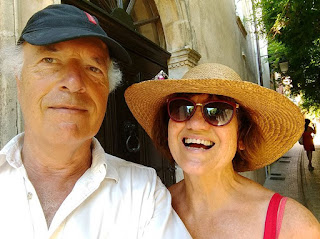Aafke Steenhuis and I are concen-trating on finishing a book,
The Big Rough Sea - World Ports and Globalization, due out in 2022. It will be a year of intensive work to get it done the way we want. It is the most comprehensive and challenging book we have ever written or edited (I have edited many books on the world economy, see
FONDAD books - http://www.fondad.org/catalog/all.html).
We started the book in 2013, slowly, when we visited Latin America's largest port, Santos (Brazil), and Valparaíso (Chile). In the following years, we conveniently visited ports in Asia (Shanghai, Hong Kong, Singapore, Mumbai, Dubai), North America (Los Angeles and Long Beach) and Europe (Hamburg, Rotterdam, Barcelona, Marseille, Genoa, Piraeus ). We have yet to go to Cape Town and Alexandria in Africa, and hope we can also visit Murmansk and Sydney - all in 2021.
For the book, we have made a website: The Big Rough Sea - World Ports and Globalization.
Here is the pitch we wrote for our publisher in Rotterdam:
The
Big Rough Sea - World Ports and
Globalization (2022)
“We live in an age deeply influenced by
maritime enterprise, but our percep-tions of
its importance have shifted almost 180
degrees in only two or three generations.
Today we see pleasure where our forebears
saw peril, and we can savor the fruits of
maritime commerce without being remotely
aware of its existence, even when we live in
cities that originally grew rich from sea
trade,” says the American maritime writer
Lincoln Paine, who is one of the many
persons Aafke Steenhuis and Jan Joost
Teunissen have interviewed for their book.
Thousands of years ago, international trade
was conducted by land and sea from the
ancient cultural regions of Egypt,
Mesopotamia, China and India. In the course
of time other peoples, such as the Greeks,
the Romans, the Arabs, the Vikings took part
in this early globalization. From the Middle
Ages, international trade became entangled
with powerful European city-states, sailing
ships with cannons, the establishment of
trading posts and the conquest of colonies,
slave trade, industrialization and
exploitation, steam shipping and diesel oil
shipping. After the introduction of
containers, around 1960, cargo ships became
bigger and bigger, transport costs lower,
with the result that production and labor
moved to low-wage countries. Asian countries
developed rapidly. The seven largest world
ports are now in China. Rotterdam was the
largest port in the world from 1962 until
2005.
The globalization of the last decades has
created a global consumer society that is in
the process of bringing about dramatic
climate change and extinction of the
species. Desperate efforts are now being
made to turn the tide by making ports and
ships cleaner and switch from fossil to
green energy. This means that ports have
become the pivot in the search for a better,
cleaner world, because ninety percent of
world trade is carried out by ship.
How can the runaway global economy become
sustainable? How can wild capitalism be
tamed?
Ports used to be the distributors of
products, techniques, cultures, religions,
as well as infectious diseases. They still
supply oil, coal, grains, machines, cars,
chemicals, smartphones and many other
manufacturing and consumer goods. What is
the history of these ports? How is and was
life in these port cities? How do the people
who work there view, for example, the rise
of China and other Asian countries, climate
change, the future of ports?
With those questions in mind, Aafke
Steenhuis and Jan Joost Teunissen traveled
to port cities in Asia, North and South
America, Africa, the Middle East and Europe.
They visited fascinating and colorful ports
such as Shanghai, Hong Kong, Singapore,
Mumbai, Dubai, Piraeus, Genoa, Marseille,
Rotterdam, Hamburg, Alexandria, Cape Town,
Santos and Los Angeles. In The Big Rough
Sea - World Ports and Globalization
they map out the history and future of world
ports and world shipping.




